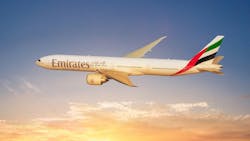GE Aviation, Emirates Plan 100% SAF Test Flight
GE Aviation agreed with Emirates to conduct a test flight of one of the carrier’s Boeing 777-300ER jets, powered by twin GE90 engines and using 100% Sustainable Aviation Fuel. The trial is expected by the end of 2022. The “milestone collaboration” is expected to demonstrate how widebody commercial aircraft using jet fuel made from alternative sources can lower lifecycle CO2 emissions compared to petroleum-based fuels, with no operational issues.
The demo flight also supports Emirates’ and GE Aviation’s efforts to reduce CO2 emissions as the industry looks to scale up its use of SAF.
Sustainable aviation fuel (SAF) is produced using waste oils from biological sources (e.g., cooking oil, other non-palm waste oils from plants, agricultural residue, or non-fossil CO2), or solid waste from homes or businesses (e.g., packaging, paper, textiles, food waste.)
Currently, commercial aircraft are certified to operate on a maximum of 50% SAF blended with conventional jet fuel, though aircraft and jet-engine manufacturers have made commitments to increase the effective applicability of the alternative fuel. Last month, for example, Rolls-Royce completed a successful test flight of a Trent 1000 engine using 100% SAF on a Boeing 747 Flying Testbed aircraft.
GE Aviation noted that all its engine models can operate with approved SAF.
“GE Aviation is committed to pursuing efforts to reduce CO2 emissions from commercial aviation, including developing technologies for the fleet in service and the future of flight,” stated John S. Slattery, president and CEO. “This collaboration with Emirates is key to our efforts to standardize 100% SAF globally, which could provide a significant opportunity to expand the impact of SAF on aviation’s carbon reduction efforts.”
In addition to customer support, GE Aviation will complete necessary technical reviews to confirm the engines will meet performance specifications and provide any pre- and post-flight directions, as needed.
Emirates will work with regulators to secure approvals for experimental type certification, and coordinate with airframe, Auxiliary Power Unit (APU) and OEMs on pre- and post-flight requirements, in addition to closely working with SAF suppliers on procurement and delivery logistics.
